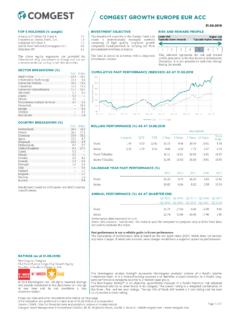Transcription of Energy : The Next Fifty Years - OECD.org
1 How long willconventionalfossil fuelsremain the predominant source ofenergy? Does nuclear power have afuture? What new Energy technologies areemerging on the horizon? What are theimplications of the growing role played bydeveloping countries as producers and users ofenergy? What can be done to avoid internationalenergy crises in the future? How will the informationsociety affect the production and use of Energy ? And whatwill be the long-term implications of internationalenvironmental agreements for a sustainable Energy future?Endeavours to set world Energy on a sustainable footing areentering a critical phase.
2 By 2050 the Energy landscape couldbe completely transformed. A highly diversified mix ofconventional and new fuels will be in use; unprecedented levelsof Energy efficiency in transport systems, housing and otherinfrastructures will likely have been attained; and people couldat last be reaping the rewards of environmentally responsiblelifestyles. But such a shift towards sustainable use of energywill take decades to achieve. This book reviews the options likely to shape theenergy picture over the next half-century, andassesses some of the key issues economic,social, technological, environmental thatdecision-makers in government andcorporations will need to address in thevery near future.
3 (03 1999 01 1 P) FF 160 ISBN 92-64-17016-29:HSTCQE=V\UV[W: Energy : The next Fifty YearsOECD-99 ORGANISATION FOR ECONOMIC CO-OPERATION AND DEVELOPMENTENERGYTheNextFifty Years OECD, 1999. Software: 1987-1996, Acrobat is a trademark of rights reserved. OECD grants you the right to use one copy of this Program for your personal use only. Unauthorisedreproduction, lending, hiring, transmission or distribution of any data or software is prohibited. You must treat theProgram and associated materials and any elements thereof like any other copyrighted requests should be made to:Head of Publications Service,OECD Publications Service,2, rue Andr -Pascal, 75775 ParisCedex 16.]
4 The next Fifty YearsORGANISATION FOR ECONOMIC CO-OPERATION AND DEVELOPMENTORGANISATION FOR ECONOMIC CO-OPERATIONAND DEVELOPMENTP ursuant to Article 1 of the Convention signed in Paris on 14th December 1960,and which came into force on 30th September 1961, the Organisation for EconomicCo-operation and Development (OECD) shall promote policies designed: to achieve the highest sustainable economic growth and employment and a risingstandard of living in Member countries, while maintaining financial stability, andthus to contribute to the development of the world economy; to contribute to sound economic expansion in Member as well as non-membercountries in the process of economic development.
5 And to contribute to the expansion of world trade on a multilateral, non-discriminatorybasis in accordance with international original Member countries of the OECD are Austria, Belgium, Canada, Den-mark, France, Germany, Greece, Iceland, Ireland, Italy, Luxembourg, the Netherlands,Norway, Portugal, Spain, Sweden, Switzerland, Turkey, the United Kingdom and theUnited States. The following countries became Members subsequently through accessionat the dates indicated hereafter: Japan (28th April 1964), Finland (28th January 1969),Australia (7th June 1971), New Zealand (29th May 1973), Mexico (18th May 1994), theCzech Republic (21st December 1995), Hungary (7th May 1996), Poland (22nd Novem-ber 1996) and Korea (12th December 1996).
6 The Commission of the European Communi-ties takes part in the work of the OECD (Article 13 of the OECD Convention).Publi en fran ais sous le titre : NERGIE : LES PROCHAINES CINQUANTE ANN ES OECD 1999 Permission to reproduce a portion of this work for non-commercial purposes or class-room use should be obtained through the Centre fran ais d exploitation du droit de copie(CFC), 20, rue des Grands-Augustins, 75006 Paris, France, Tel. (33-1) 44 07 47 70,Fax (33-1) 46 34 67 19, for every country except the United States. In the UnitedStates permission should be obtained through the Copyright Clearance Center,Customer Service, (508)750-8400, 222 Rosewood Drive, Danvers, MA 01923 USA,or CCC Online: All other applications for permission toreproduce or translate all or part of this book should be made to OECD Publications,2, rue Andr -Pascal, 75775 Paris Cedex 16, the coming decades, the Energy sector will face an increasingly complexarray of interlocking challenges economic, geopolitical, technological, envi-ronmental and not just in the OECD countries.
7 As the developing world s popula-tion continues to expand, the Energy needs of billions of additional people in ruraland especially urban areas will have to be met. Meanwhile, supplies of conven-tional oil and conventional natural gas are expected to decline in the not-too-distant future, becoming increasingly concentrated in the Middle East (oil) and insuch countries as Russia and Iran (gas). A further constraint on the use of conven-tional Energy resources, including coal, will almost certainly come into play asincreasingly tight limits are placed on the total amount of greenhouse gases thatcan be released into the atmosphere and that constraint will in turn lead togreater interest in alternative Energy sources and technologies.
8 The responses tothis varied range of developments will play a crucial role in shaping trade andinvestment flows, competitive positions, and the structure of economies acrossthe globe, while simultaneously determining mankind s capacity to construct asustainable these challenges will require very long lead times. Indeed, renewingthe existing patterns of Energy production and consumption transport and othertechnical infrastructures, the layout of cities, the nature of the industrial capitalstock, current technologies, values and attitudes, etc.
9 Could take as long as examine these issues, an OECD Forum for the Future conference was heldin co-operation with the International Energy Agency (IEA) in July 1998, in event brought together leading players from government, business andresearch, to explore the challenges and likely trends and developments in worldenergy through 2050; to examine the opportunities and constraints posed by thelikely evolution of key factors such as the geopolitical landscape, new modes oftransport and Energy technologies, and climate conditions; and to consider, from amultidisciplinary perspective, the range of possible strategic : The next Fifty Years4 The conference was organised into four sessions.
10 The first aimed at providingan overview of the Energy outlook first to 2020, then to 2050 with a view to iden-tifying some of the key uncertainties and challenges. The geopolitical dimensionand environmental issues formed the focus of the second session, while the thirdassessed the likely evolution of Energy demand patterns and the potential forenergy technologies, old and new. The fourth session was devoted to discussion ofstrategic options for policy-makers and corporate publication brings together the papers presented at the meeting, as wellas an introduction to the main issues prepared by the Secretariat.















